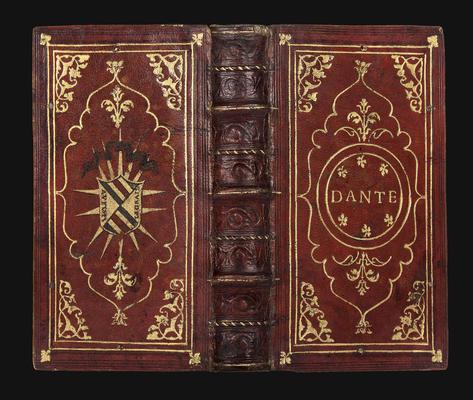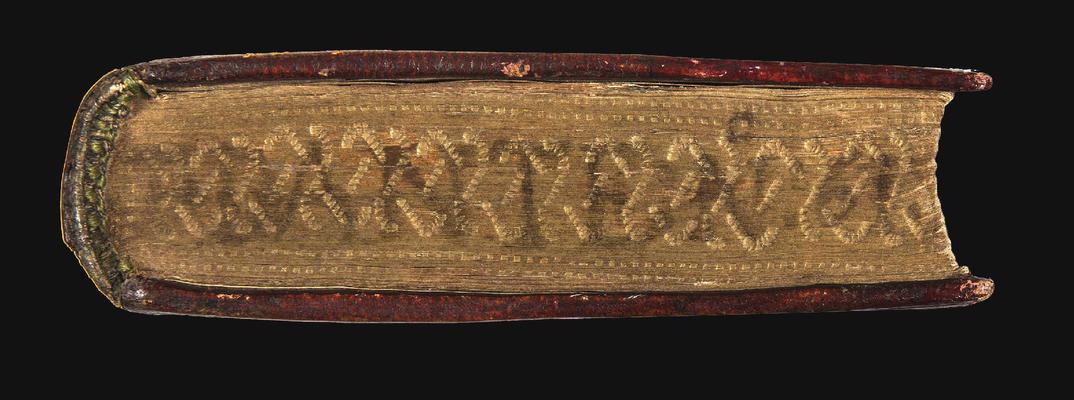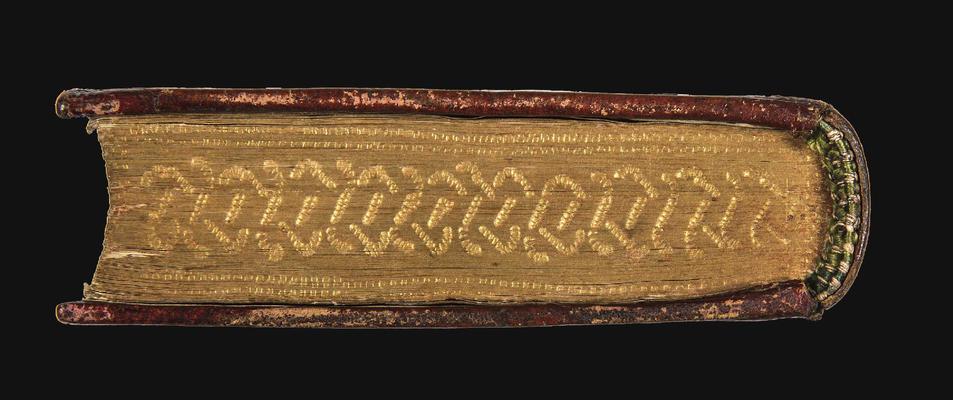Dante Alighieri
Dante col sito, et forma dell’Inferno.
[Toscolano], Alessandro Paganini, [between 1527-1533].8° (156x89 mm). Collation: a-z8, A-H8. [248] leaves. Complete, including the blanks l2 and H7. Italic and roman type. Blank spaces for capitals, with printed guide letters, at the beginning of each cantica. One double-page woodcut Hell's topography (fols. H4v-H5r), two full-page woodcut diagrams showing the categories of sins punished in Hell (fols. H5v and H6r), and Purgatory (fol. H6v). Contemporary Venetian red morocco over thin pasteboards, bound ca. 1540 by the ‘Fugger Binder' for Diego Hurtado de Mendoza. Covers tooled in gilt with open and solid foliate tools, both with gilt undulating lozenge-shaped cartouche; on the upper cover the gilt title ‘dante' in a roundel, on the lower cover the painted arms of Hurtado de Mendoza, and his motto(lettering slightly different, probably as result of later repair). Spine with three double and four single bands tooled in gilt, compartments with blind foliate decoration. Gilt and gauffered edges; manuscript horizontal title in black ‘el infierno' on the fore-edge, on top edge ‘Dante no. 61'. Missing 4 pairs of ties, head of spine with light cracking and small loss, tiny restorations at corners, small loss of paint. Modern morocco box. An excellent copy. Censor's note dated 7 July 1585, on the verso of the first leaf, ‘visto & approuado a 7 de Julio de 1585 a[ñ] o. & se puede de tener e leer El Bispo de medinaceli'. On the front pastedown the pencilled shelfmark ‘Italien. Lit.T IV', on the recto of the front flyleaf the inked one ‘E.36.A'. On the rear pastedown the pencilled shelfmark ‘M Ms.IV.1'. Some verses inked out in accordance with the stipulations of the Spanish Index: Inf.,xi7-9 (fol.c8v), Inf.,xix106-117 (fol. f4v), and Par.,ix136-142, fol. A1v.
Provenance: Diego Hurtado de Mendoza (1503-1575; armorial binding); Juan de La Cerda, Duke of Medinaceli(1544-1594); Librairie Gumuchian, Cataloguexii, Paris 1930, no. 54; Martin Breslauer, Books, Manuscripts, FineBindings, Autograph Letters from the Ninth to the Present Century. Catalogue 102, London 1971, no. 41; Livio Ambrogio collection.
An outstanding copy from the library of Diego Hurtado de Mendoza, of the rare Dantein octavo printed by Paganini. The poet, historian, Greek scholar and important collector Hurtado de Mendoza belonged to one of the greatest families in Castile. In 1539 he was sent to Venice as the ambassador of Charlesv, and during the seven years of his Venetian embassy his library grew significantly, coming to rival the collection assembled by Jean Grolier, the ‘Prince of Bibliophiles'. Don Diego collected printed books as well as Greek manuscripts; he made his library in Venice available to friends and scholars, encouraged their studies, and lent his precious manuscripts to printers. He paid great attention to the bindings of his volumes, and employed the best and most sought after Venetian bookbinders. The binding for this Commedia was commissioned from the excellent craftsman known as the Fugger Binder, so named after his principal client Johann Jakob Fugger, of the Augsburg banking family. This binder received commissions from many other private clients, and his business seems to have started in the mid-1530s.
This binding was made in about 1540, and the Spanish title horizontally displayed on the book's fore-edge – ‘el infierno' – possibly reflects Mendoza's early adoption of a vertical storage system for his volumes. The present copy is included by Hobson in his census of the bindings made by the Fugger Binder.
After Mendoza's death in 1575, most of his books became part of the Escorial Library, founded by Philipiiin the monastery of San Lorenzo. The present volume evidently never went to the Escorial, and in 1585 was in the hands of Juan de La Cerda, Duke of Medinaceli and Grandee of Spain, as shown by the dated inquisitorial note on the verso of the first leaf granting him a licence to possess and read the work.
Books with Mendoza's provenance are very scarce outside the Escorial Library, and rarely appear on the market.





